#french essayists
Explore tagged Tumblr posts
Note
hey so your notes on the internet safety post made me realize that we watched the exact same internet safety video as kids. and i found it! its a mcgruff the crime dog animation called faux paw the techno cat, and its on youtube
Yeah!!! Faux Paw! I remembered all the cat stuff so clearly with the cursor helper and the horrible cgi that I completely forgot that it was a Mcgruff the crime dog animation.
I looked into it, and it turns out that some reposts of the animation online cut out the McGruff part, so I probably watched a version without it and just forgot about it.
(Version from 14 years ago with the Mcgruff into:
youtube
And version from 3 years ago with the Mcgruff opening cut out, reposted by the channel behind Faux Paw: )
youtube
Also, it turns out that Faux Paw has multiple shorts made as recent as 3 years ago... but the animation quality has gone down a LOT.
And just quality in general.
Here's, for example, a really bad short, also uploaded 14 years ago, with completely different animation, tone, and just general... everything.
Also, it's kinda racist. It takes place in China, and it handles it about as well as you think it will.
https://youtu.be/hGfjyDALM2Q
I think a detail that stuck out in this is probably the fact that whoever animates or draws this keeps giving Faux Paw 6 fingers. Like. When she points to say something, you can see a pointer, 4 folded fingers, and a thumb. This is jarring in normal contexts, but I think it's even weirder when a character was previously shown with 4 fingers (which is just the 4 digits on a cat's paw and no dewclaw)
Turns out! This is on purpose! Sometime between the original short and now, they decided to make Faux Paw a polydactyl cat! Which is kinda interesting, and I was gonna list it as an animation mistake above before I went on the official website to read about her.
Another fun fact! I googled Faux Paw to see if there was a former collaboration with McGruff and if there was more information on the production of the series. The first result I got was Faux Paw trippy/drug/high shirts that were likely a stolen design.

Which like, if it wasn't for my dislike of general "trippy" art and the fact that it's likely a stolen design being sold by a random quick cash t-shirt business, I would consider it. (The website itself is super iffy and relies on a lot of "buy now before it's gone!!" Tactics. It does have a lot of artists that work for the site and is not just a t-shirt printing machine like some sites... but the specific artist behind this trippy Faux Paw shirt has a lot of designs I've seen before. Since there's no dates on the designs, I can't confirm if this artist team is simply the mastermind behind every Spencer's shirt, if they're just taking designs, or some third thing. But that's a whole separate rabbithole.)
I also saw a listing involving her that was 2,000 dollars and was from a company called "Robotronics". I thought with a name and price tag like that, it was going to be a little Faux Paw robot or animatronic...
It was not.

You can see the extra fingers in the suit costume. Apparently, this is a website dedicated to making costumes, robots, and (for lack of a better term) merch about safety for children.
In the end, I couldn't find much information on the development of Faux Paw, her relation to Mcgruff the Crime dog, or the weird fall from grace (well. Whatever grace the original short had). If you simply google Faux Paw, you're gonna end up with a LOT of pdfs from teachers. But it seems like some form of internet safety is still being taught by some teachers. Yippee!
Basically: I did remember the name Faux Paw, but if you didn't mention McGruff the crime dog, I probably wouldn't have gone down this rabbithole. And I thank you for that.
#sorry this was gonna be a quick answer where i just say I remember it but then I fucking saw there were MORE shorts and I had to watch it#i had to watch the gamer one when it popped up#also I was not prepared for the racism#racism tw#every time i go back to edit it i end up adding more info as i research#i am just gonna post it now. if it's incoherent im sorry i just needed to stop myself from adding another paragraph about this french cat#anyways if you want to do more research be my guest#i can only hope some youtube essayist will pick up the torch from here and go on a Faux Paw rabbithole
21 notes
·
View notes
Text
oh WAIT I think the piano girl actually was the one that hired Jef in le samourai (1967). because she was in the same house as his contractor? but then didn't answer Jef's call? And also she wasn't afraid of him and actively deviated the police from his trace
#if this is the thing the movie isn't half that bad then like it would all tie in nicely together#but anyways that was a frenchest french movie like slow pretencious orientalistic and shitty ending for a#barely sensical plot that makes you feel like it was all for nothing#like ok. whatever. the essayists and cinephiles that brainwashed me into watching#this need to understand the worst sin for a movie is being boring#i'll admit i watched this kne for al*in d*lon and he barely did anything lol plain performance for even plainer character#the piano girl was my favorite by far she was ~mysterious~ but in an almost good way#laura watches stuff
0 notes
Photo
Jan Gondowicz (b. 1950) is a critic, translator and essayist living in Warsaw. He studied Polish Philology...
In a Café, 1873. Edgar Degas
The picture was painted in the studio and not in the cafe.
Degas asked people he knew to pose for the figures: Ellen André was an actress, and an artist's model; Marcellin Desboutin was an engraver and artist. The painting cast a slur on their reputations and Degas had to state publicly that they were not alcoholics.The off-centre framing, introducing empty spaces and slicing off the man's pipe and hand, was inspired by Japanese prints, but Degas uses it here to produce a drunken slewing. The presence of the shadow of the two figures painted as a silhouette reflected in the long mirror behind them is also expressive and significant.
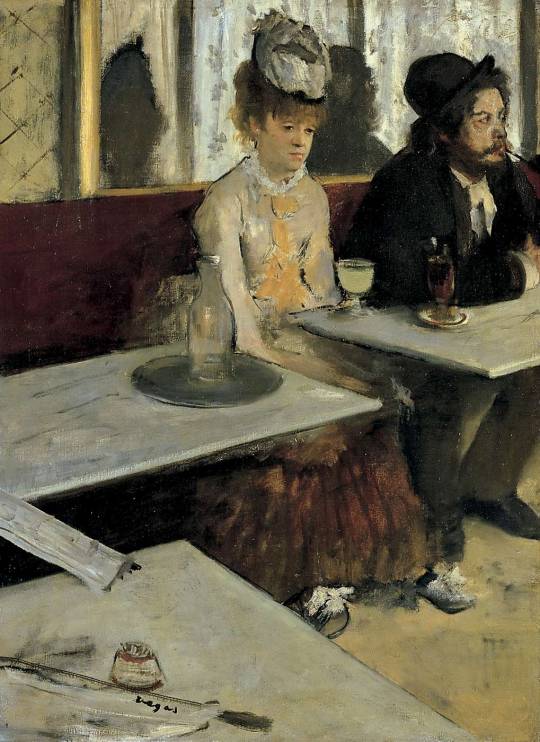
“W 1876 roku spod pędzla Edgara Degas wyszła istna ikona dekadencji - Absynt. On, rozkudłany, w meloniku zsuniętym na tył głowy, gapi się w przestrzeń. Ona, w zszarganej jedwabnej sukni, kompletnie sztywna, nie widzi już stojącego przed nią kieliszka z mętną cieczą. W kieliszku pływała podobno, zdrapana w latach 20. podczas konserwacji płótna, autentyczna zdechła mucha. Skądinąd ta para wyrzutków to przedstawiciele artystycznej bohemy i patronuje im słownikowe sąsiedztwo absyntu: absencja i absolut. Poprzez absynt odbywała się bowiem komunia świata artystów ze światem lumpów. Lumpów pociągał absyntowy kop, artystów magia.”
Jan Gondowicz - Gwiazda Piołun
#edgar degas#1834-1917 french#impressionism#jan gondowicz#b. 1950 polish critic/ translator/ essayist
19 notes
·
View notes
Text
youtube
new video about Edgar Wright's Cornetto Trilogy, and how everyone* keeps getting them wrong! this video is sponsored by Nebula, a place where you can watch the original version of this video before I had to tweak it for YouTube's copyright bots. (by clicking that link, you can get an annual subscription for 40% off.) or you can just back me on Patreon, which is also cool and good.
transcript below the cut.
I adore Edgar Wright’s Cornetto Trilogy. I flirted with making a video about it ages ago, had a draft of a script, but ultimately decided it wasn’t about anything except “here’s a thing I like, and here are its (I thought) very obvious themes.” So I shelved it. But, in the years since, I have seen multiple video essayists on this here website claim that these movies are about growing up and taking responsibility. (I say “multiple.” It’s not a lot. But it’s more than one! And that’s enough.)
These people are 100% wrong.
Lemme lay it out: the Cornetto Trilogy is not about growing up. It is not about taking responsibility. It is the exact opposite, and that’s not subtext. It is three movies about stunted manchildren thrust into extraordinary circumstances, and each, in the end, is saved - is redeemed - by abandoning his character arc and failing to grow or change. It is a three-part love letter to immaturity.
And I guess I have to set the record straight.
Sometimes making a video about a thing you love is an act of appreciation. And sometimes it’s out of spite.
The Cornetto Trilogy is three movies: Shaun of the Dead, Hot Fuzz, and The World’s End. All three are written by Simon Pegg and Edgar Wright; Pegg stars, and Wright directs; all three center on a relationship between Pegg and real-life best friend Nick Frost, which makes each film a reunion of the core team behind Spaced (excepting, but for a small role in Shaun of the Dead, Jessica Hynes). The three films span three genres: zombie apocalypse, buddy cop, alien invasion; each features a Cornetto ice cream cone: strawberry to represent blood, original blue to represent the police, and mint to represent little green men; this is a joking nod to Krzysztof Kieślowski’s Trois Couleur films, Bleu, Blanc, and Rouge, which were based on the colors and themes of the French flag (I don’t care what you say, Emily: #TeamRouge); that nod is funny because Trois Couleur is high-art drama and these are comedies. All three are parodies of, tributes to, and actually surprisingly good executions of their respective genres. And the hook, the gag at the center of all these movies, is that Simon Pegg plays a character wholly unsuited to be starring in this kind of film.
Shaun, the burnout, is the wrong person to survive the zombie apocalypse; by-the-book British bobby Nicholas is the wrong person to lead an American-style bombastic actioner; and alcoholic asshole Gary is the last person to save the world from aliens.
And I think that’s where people get stuck. Because “schlub finds himself protagonist of a genre film” is the elevator pitch for like a dozen Adam Sandler movies. The genre trappings may be as mundane as parenthood or mandated anger management classes, or as high-concept as action movie, whodunnit, or time travel It’s a Wonderful Life if Clarence were Christopher Walken as the angel of death (that… that makes it sound good, it’s not, don’t see Click; leave Frank Capra alone, Adam). But all these movies have the same basic shape: an extraordinary situation forces a guy to confront his shortcomings, which always stem from having never grown up. And you probably haven’t seen all of these movies, but if you’ve seen any, I bet you have assumptions about how the rest end: even though “Adam Sandler acts like a child” is generally the selling point of an Adam Sandler movie, they all end with some lip service toward becoming an adult: hey man, grow up a bit; appreciate your family a little more; square your shoulders; clean your room. This is so standard, it was parodied mercilessly in Funny People.
And this was a formative microgenre for my generation! Whole universe turns itself upside down to teach some shitty dude to, like, do the dishes and pay his wife a compliment now and then - Liar Liar, Bruce and Evan Almighty (all directed by the same guy, by the way). So I don’t blame people of a certain age for seeing the first act of Shaun of the Dead and thinking “I know where this is going.” And when, at the last minute, it swerves and goes someplace else, you could read that as a gag, a final subversion of expectation, still the same basic shape. But no! No! Once is a gag - thrice??? Thrice is a thematic statement!
So lemme make my case. I’ma take you through these movies one by one - we’ll talk about the manchildren and the expectations set by the genre, and then we’ll talk about that last-minute swerve and what it means. And then you’ll tell me I’m right and apologize!
Shaun of the Dead:
Shaun is a man in his twenties. What kind of manchild is he? He’s the slacker.
What is his problem? He needs to sort his life out. Shaun doesn’t know how to take action. He hasn’t advanced since college - he’s been working the kind of job a teen takes over the summer for like a decade, lives with the same best friend, has the same petty fights with his stepdad, goes to the same pub every week with the same group of people. He can’t make a reservation, he can’t manage a calendar, he’s a washup. This makes his girlfriend, Liz, feel stifled, trapped; he is a weight around her ankle, taking her on the same date week after week, keeping her from living her own dreams, having her own adventures. She gives him one last chance to prove he can sort his life out, and he blows it, and she dumps him.
And then: a zombie movie happens.
The genre forces him to confront his shortcomings: to survive, and save his loved ones, he’ll have to take action, make plans, be decisive. This is a common fantasy: when you feel ground down by the mundanity of life, you might imagine, oh, if only a crisis would happen, like a zombie virus outbreak, where my normal-life problems like “am I gonna make rent,” “is my girl gonna take me back,” “is my roommate gonna kick out my stoner buddy who’s crashing on the couch” become meaningless, and it’s immediately clear what’s really important, what matters. Then I’d know exactly what to do. It’s why disaster movies work as escapism: a necromantic plague - or at least the fantasy of one - is sometime preferable to normal life.
Hot Fuzz:
Nicholas is a man in his thirties. What kind of manchild is he? He’s the hall monitor.
What is his problem? He can’t switch off. He is a hypercompetant police officer with a rulebook where his brain should be. He’s so good at being a cop that he’s spotting and unraveling crimes even on his day off. He can’t maintain a relationship, has no friends, all his coworkers hate him because he keeps finishing their work for them, and his stats show up the rest of the force so badly that they scuttle him out to the country.
Now you might be thinking, “Mmm. A fastidious police officer who can’t have fun? How is that a manchild? Sounds pretty grown-up to me. You’re reaching, bud.” Ohhhh ho ho, smartass, do you remember this scene? [bar scene] Yeah! Nicholas Angel has a five-year-old’s notion of law and order. He’s still playing cops and robbers.
And that’s a problem, because then: an action movie happens.
It doesn’t happen all at once: he goes out to the country and finds they do things a bit differently there. They are (ostensibly) less concerned with rules than what than the rules are for: if the purpose of drinking laws is to keep the streets safe and orderly, and letting some people off with a warning or allowing kids drink so long as they do it inside achieves that end, the rule can be bent. That’s a judgment grown-ups can make; I mean, they’re the ones who wrote the rules in the first place. So be lenient with shoplifters, don’t hassle people for speeding; this isn’t the Big City, you can use your better judgment. But Nicholas never got past doing whatever Mom & Dad said; obedience, and trusting whoever’s up the chain, is his entire moral framework. He can’t accept that bending the law could be more righteous than following it.
But also maybe there’s a criminal conspiracy murdering people and writing it off as accidents and the police chief might be in on it. Or maybe Nicholas is so desperate for a big case with no moral ambiguity that he’s seeing things where they aren’t.
The genre forces him to confront his shortcomings: either there’s nothing going on and he needs to chill out about procedure, or the department is corrupt and he’ll have to go rogue like it’s Point Break - and this is how he experiences Point Break. [“paperwork”]
No matter what, he’ll have to bend the rules, which he constitutionally cannot do.
The World’s End:
Gary is a man in his forties. What kind of manchild is he? He’s the delinquent.
What’s his problem? Pfffft. What isn’t his problem? Gary is a manipulative, narcissistic, lying, self-destructive, ignorant, violent, thieving, shit-talking, unapologetic asshole who peaked in high school when being all those things was still kind of badass. The greatest night of his life was the drunken pub crawl after graduation he and his friends didn’t even finish, and he’s been tumbling downhill ever since. He’s spent his life ruining everyone who knows him until there’s no one left to ruin but Gary King. So now it’s time to bully the old gang into going back home with him to relive that night by finishing the pub crawl, because, in his own words, it’s all he’s got. And he and his friends have to confront how home has changed since they left - the bars have gentrified, not everyone recognizes them; the defining, epic deeds of Gary’s youth have been forgotten. You can’t actually go back because that place doesn’t exist anymore.
And then: a sci-fi movie happens.
Turns out the town’s been taken over by aliens, and all the people who couldn’t conform to their new order have been replaced with robots! That’s why no one recognizes them! And that’s why the pubs all look the same: the aliens are homogenizing everything! And it’s clear, if they can’t get Gary and his friends to play ball, they’ll roboticize them as well! The obvious move is to get the hell out of town, but Gary keeps inventing excuses to stay and finish the pub crawl, and they sound pretty sensible because the group’s already five pints in. The genre forces him to confront his shortcomings: sooner or later he’s gonna have to give up on recapturing his youth and do what’s best for him and his friends now, even if it means running back to the city where all his problems live.
So there we have it: the characters cross the threshold into an unfamiliar world where an external conflict cannot be addressed without resolving the tension within. The slacker will have to get his shit sorted, the hall monitor will have to break the rules, and the delinquent will have to do what’s good for him. And, to an extent, all three know this! The movies Wright and Pegg pay homage to exist in these stories - Shaun knows what a zombie is, Danny keeps Nicholas up watching Point Break and Bad Boys II, and Gary and friends know bodysnatcher movies so well they have philosophical debates with the robots about whether “robot” is the PC term.
So, yeah, if you turned the movies off there, I could forgive you for thinking that’s where they’re headed. But you goofballs watched them to the end and then made content about them, what is wrong with you???
What actually happens in the second halves of these movies?
Shaun twigs that he’s in a zombie movie and, at first, tries to play the part - his survival plans are miniature hero’s journeys with him as protagonist, wherein he’ll save the day by neatly confronting all his flaws. He’ll resolve parental conflict by saving his mom from his zombified stepdad, resolve romantic conflict by showing his girl he can come through when it counts, and resolve internal conflict by being a man who saves the day. And all his plans suck! It’s just the same plan he always comes up with! Dragging around the same useless liability of a bestie, collecting the same group of people, and holing up in the same pub! He doesn’t save his mom: his stepdad apologizes, resolving their conflict for him, and then survives in zombie form but Shaun’s mom gets killed; most of the friend group gets killed because the crisis does not actually suspend but in fact amplifies their personal grievances; and he doesn’t save the day, just manages not to die long enough for the military to show up.
But… well, Liz wanted adventure and now she’s had enough for a lifetime, so… she’s down to just be boring with him for a while - sit on the couch, watch TV, hit the pub. Beats running for your life. Tensions with the roommate are gone cuz roommate died, but rent is covered cuz Liz moved in. Zombies don’t get eradicated, just folded into normal life, so Shaun can mindlessly play video games with his bestie forever, and it’s not a problem that bestie doesn’t have an income cuz he doesn’t need food or shelter.
The zombie apocalypse doesn’t make Shaun sort his life out, it changes the world til he doesn’t have to.
When Nicholas discovers that, yes, there is definitely a murderous criminal conspiracy inside the police department, he recognizes the only way to bring about justice is to become what Danny has always wanted and go Dirty Harry on the town. It’s either that or just swallow the crimes. But he does neither. He and Danny go on an epic shooting spree, recreating famous movie scenes, taking out the entire criminal organization against all odds, and spouting badass one-liners… but everyone who helps them is a cop, they don’t actually kill anyone, all perps are formally arrested, and they fill out all the paperwork. I think he even properly signs out the weapons. He never switches off, never breaks a rule, does absolutely everything by the book, only… louder. And this violent showdown saves him from the chill town with lax rules he thought he’d moved to. Now he, with his five-year-old notion of right and wrong, is in charge of the police department.
The buddy cop actioner doesn’t make Nicholas bend the rules, it changes the world til he doesn’t have to.
Gary knows exactly how a movie of this sort is supposed to go and spends the whole movie running from it. Friends and secondary characters keep sharing these poignant moments with him, because they know this story, too: yeah, he’s gonna reject help at first, but sooner or later he’ll hit rock bottom and then someone will get through to him. And, as the night goes on, and the characters get drunker and drunker, and Gary passes up more and more opportunities to abandon the pub crawl and go home, these moments take a tone of desperation. They start to sound more like interventions; like, Gary, we all know you’re going to come to your senses but could you hurry up with it??? How many of your friends need to literally die for you to shape up? Are you gonna get them all killed?
And the answer is: Gary will never shape up! To Gary the Human Dril Tweet, his friends trying to save him, psychiatrists trying to treat him, and aliens trying to assimilate him are all the same thing. He doggedly makes it to the end of the pub crawl and confronts the alien overlord who tells him all the technological advancements of the past few decades - all the efficiency and homogenization that’ve changed the face of his home town - are their doing. The Information Age is an intervention on behalf of Earth, a pan-galactic effort to save humanity from itself. And the reason they’ve been replacing people with robots is some people are too fucked up to go along with it.
And here’s Gary, King of the Fuckups, brashly declaring that fucking up is what makes us human. There is no freedom without the freedom to ruin your life. We are endowed by our creator with the right to be drunken, ornery pieces of shit.
He tells the aliens to piss off and he’s so fucking annoying that they do, and they take the Information Age with them.
Now… I know… ugh… I know a lot of people love this movie, say it’s the best of the three. Some friends who’ve struggled with mental health or just being an adult under late capitalism really identify with Gary, and the valorization of being a mess. I see you, you’re not wrong, I get it, I really do. But can we just… not “but” but “also” can we… can we also admit that this ending is… this is Space Brexit.
Like, literally it’s an alien invasion but symbolically this is Gary rejecting the adult world of rules and authority and doing what’s best for the community and that’s how Brexiters view the EU. And people keep telling him “Gary, this is in your best interest” and Gary says, I don’t want my best interest! I am registered in the anti-Gary’s Face Party and I will cast my vote by cutting my nose! I choose to do what’s bad for me.
And, like a true Brexiter, he chooses for everybody.
Now tell me that’s a movie about growing up. Gary collapses human civilization in its entirety rather than change, and in the world that follows, he thrives… by being an immature, irresponsible bag of garbage.
To Wright and Pegg, growing up is death, and these are movies about being alive. These characters don’t cross the threshold back into the ordinary world with the ultimate boon of character growth; all three stay in the extraordinary world. The zombies remain, the robots remain, Nicholas is offered his London job back and chooses to stay in the country. These are stories about normal life spontaneously turning into a genre film, and they are made with deep love for those genres; why would they end with leaving those genres behind? Because it’s what Adam Sandler would do?
So there you have it. I rest my case.
“Okay Ian. Why does this matter?”
…what was that?
“You’ve made your point: these movies aren’t about growing up or taking responsibility. So what?”
Uhhhh.
“Bring it home for us.”
…
“Why do you care so much?
[breath]
I wrote the first draft of this script when I was around Shaun and Nicholas’ age, and “so what?” is why I shelved it. Now I’m Gary’s age, this video’s been in the back of my brain the whole time, but I got this far and “so what” is where I got stuck, again. This is why the CO-VIDs came out quicker, cuz I let myself end with “so that’s interesting!” and got on with my life. But there’s clearly something sticky here, more than “someone is wrong on the internet.” (Also, to the YouTubers I’m vaguebooking, who said these were movies about growing up - I’m way more annoyed at the folks I’ve argued with on Twitter about this, you just made a better rhetorical device; you do not owe me an apology!) (Also, to the commentariat: I am not extrapolating this from like two data points, this is chronic and recurring and has been bothering me for years.)
There are a few directions I could take this to give it some “cultural weight.” I could put on my social justice hat and talk about how the “crisis of adulthood” doesn’t play as broad comedy unless you look like Adam Sandler or Simon Pegg, or put on my class analysis hat and talk about how signifiers of adulthood are, traditionally, ways of spending and accruing capital which are, today, often inaccessible to people under 40.
And that’s all legit, but here’s the real deal: I’m just mad at Gary. The world changed around Shaun such that he could stay a child. And Nicholas ended up somewhere he could stay a child. If you missed that, you’re wrong, but whatever. But to say that Gary grew up grinds me, because Gary chose this. The whole movie is people telling him to grow up, and he says no! He says it out loud! He says it to the literal end of the world. To walk out of the theater and say “that’s a movie about growing up” is more than a mistake, it’s a refusal. It’s trying to “fix” the movie by fitting it into a more familiar shape, so it doesn’t say what it says, so Gary isn’t who he is, who he chooses to be.
I’m being cheeky when I say this because he’s a fictional character, but saying Gary grew up is enabling.
Gary says there’s no freedom without the freedom to ruin your life, which is the problem with alcoholics and libertarians: it’s not just your life, Gary! You live in a community, a culture, and an ecosystem! Your actions - everybody’s actions - impact other people! That’s just the way the world is! You can’t shit yourself at the bar without other people having to smell it. We’re all fuckin’ connected, man! You don’t want anyone’s will imposed on you; you spend the whole movie imposing your will on everyone else! You say humans don’t wanna be told what to do, and then you decide humanity’s future by yourself with no input or consent from anyone!
People point to Gary ordering water in the last scene instead of beer as evidence that he got sober, like that’s proof that he did grow up in the end, which are you fucking joking??? Getting sober is a shorthand for maturity the way buying a house is, it doesn’t signify anything in and of itself! Gary drank to escape the adult world of rules and responsibilities! So, yeah, under normal circumstances getting sober would mean he’s made peace with that world and is ready to integrate. But that’s not what happened! The thing he was escaping doesn’t exist anymore! He literally destroyed it!! People died! Probably millions! Now he lives a happy life LARPing as Omega Doom - no I don’t expect you to catch that reference! He doesn’t need to drink! He is literally reliving the best day of his life forever. And even if it did mean personal growth, the idea that a person could make what would be, unequivocally, the most selfish decision in human history, and then spend his life celebrating the outcome, oh but if he overcame a personal demon in the process then on balance that’s maturity? That is lightspeed solipsism! Who are you if you think that way? Are you all Adam Sandler???
And none of that makes this a bad ending, or Gary a bad character. I mean, he is the reason The World’s End is my least favorite, and I don’t like the ending, but I don’t think it’s bad that I don’t like the ending. Rather than watch another addict pull his life together or destroy himself, we watch a downward spiral with so much gravity the whole world self-destructs alongside him. And that’s why The World’s End is the most interesting of the three: it is a bold choice, and I think we are free to feel however we want about the conclusion Gary engineered for himself. I don’t think it’s valid to pretend it didn’t happen.
In the context of the trilogy, we see that Shaun’s immaturity is mostly a problem for Shaun: he would be, at worst, a footnote in the lives of the people who love him; “yeah, I liked Shaun a lot, but I couldn’t carry him through life anymore.” Nicholas is the kind of overachiever that is useful if pointed in the right direction; juvenile code of ethics aside, he is, empirically, helping the community (within the entirely fictional framework where that’s a thing police do). If the world hadn’t changed to turn their flaws into strengths, they would still be relatively harmless. Gary is what happens when immaturity isn’t harmless, and shows us how a world built by that immaturity would look.
There is an appeal to Gary King, a wish fulfillment. Letting your id fully off the leash because you no longer care what anybody thinks - it’s why some people drink, and it’s why some people would like to drink with Gary. But if that’s not just your Friday night, not just your twenties, but that’s your life? There is a destination at the end of that road, and it’s Gary doing something truly ugly. And we see that ugly thing the way Gary sees it: as awesome. But then you see the reality: the Monday morning after the Friday night. We went out with Gary and he did something terrible.
And I’m not telling you to hate Gary for it; I’m not saying Gary can’t be forgiven. In fact, seeing it for what it is is the only way Gary could be forgiven, because, if he “grew up and took responsibility,” there’s nothing to forgive.
I think this is the only way the trilogy could have ended. I mean, you make stories about boys who get older and older and don’t grow up, it eventually becomes a problem. There’s only two ways to resolve it: you either end with a guy actually sorting his shit out, or you go for broke and show what happens if he doesn’t. And I think some of us boys saw that and said, “no, noooo, they did grow up! all three of them!” rather than say, “haha! hahaaa! ……………shit.”
260 notes
·
View notes
Text
The concept of the new antisemitism was popularized in The New Anti-Semitism, which was published by the Anti-Defamation League in 1974, was given some modest intellectual heft by the Orientalist Bernard Lewis in his 1986 book Semites and Anti-Semites, and has since been mainstreamed in some “working definitions” of antisemitism, from that deployed by the European Union Military Committee to the International Holocaust Remembrance Alliance’s highly controversial definition. The thrust of the new antisemitism thesis is that Israeli military aggression was really self-defense and that solidarity toward Palestinians was really antisemitism. Thus the French essayist Alain Finkielkraut could describe 2002, when many people protested against Israel’s ravaging of the West Bank during Operation Defensive Shield, as a “Kristallyear”; four years later, Lewis compared the atmosphere resulting from Israel’s invasion of Lebanon in 2006 to that of 1938. Those statements are functionally antisemitic. Most definitions of antisemitism, “working” or otherwise, agree that it is antisemitic to fail to distinguish between the state of Israel and Jews. It follows as surely as night follows day, that it is antisemitic to fail to distinguish between opposition to the state of Israel on internationalist, anti-colonial, and anti-racist grounds and hostility to the Jews as such. But Israel apologia depends precisely on obliterating the distinction between itself and Jews. Israel must represent itself, no matter how many Jewish people reject its embrace or protest against it, as “the state of the Jews,” the “Jew of nations,” the national self-defense of a people who could only exist elsewhere as a “foreign” element. That is what conservative politicians around the world are doing when they criminalize Palestine solidarity on the spurious basis of opposing antisemitism; that is what Britiain’s prime minister, Rishi Sunak, is doing when he talks as if all Jews support Israel; that is what authorities in Berlin and France are doing when they ban Palestine protests. They may not be desecrating cemeteries or synagogues, but their logic is the same as that of some of those who do.
254 notes
·
View notes
Text
Oh look a blatant self asking talking shit.
[Lily's Post]
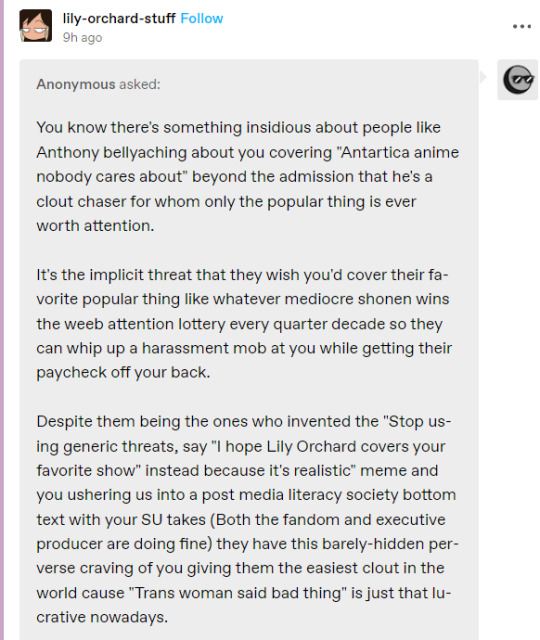


Lily people tell each other they hope you cover a thing they like as a CURSE. It is a wish of doom upon their fandom. Are you just whining that people tell you to watch FMA: Brotherhood cause it's really good again? You know it's based on award-winning manga drawn and written by a woman right?
And you get your paycheck from tearing down other peoples' creative output, Lily. Can't complain when someone does it to yours. Don't you only review children's fantasy adventure cartoons you hate because you have to "pay your rent"?
The money I get from laughing at you is like 3rd down the list of my income streams.

Way to prove you have never listened to a word I've said about Utena. I'm not the one who focuses on the allusions to Greek myth and esoteric French literature, that's a bit beyond me. Save that for the essayists on Ohtori.nu. I just talk about the plot and the symbolism cause I'm sick and tired of people who have only ever experienced Utena as an aesthetic mood board pretending they know what it's about.

You OUTRIGHT ADMITTED you spoiled the manga out of sheer spite.

You're such a child. You got called out for trashing a show you very evidently didn't even watch and so in retaliation you made a new video in which you spoil the ending of of the manga without any warning. And you had this video labeled as "First Impressions" for a while. Nobody expects ending spoilers of an unfinished anime adaptation in a first impressions video you absolute petty little bitch.

It's not a good anime, Lily. It's a dull moeblob fest the only purpose of which is to get 4 high school girls on a big technical ship. The writing is incredibly lazy, contrived and relies on increasingly improbable coincidences to get the characters from point A to point B.
And it's not like the girls in the show are actually interested in arctic research or science or ship work. Its just let's get 4 ditzy moe joshi kosei on a big ship to appeal to otaku men who like to goon over "pure" teenage girls next to engineering porn. You played yourself.
57 notes
·
View notes
Text
I know we (the fandom) has over analyzed Leander, but...

Mihn is a Vietnamese (usually boy) name meaning bright
Vere—English or French—alder tree
Kuras is Slavic???? the Polish say it means big rooster 🤨
Ais
(^ look he's Japanese in clothes and face but I have no clue where the name is from)
Leander has Greek roots originally meaning lion man. But its not popular for meaning brave, its a tragedy.
Side note


(Nerium oleander (left) is a flower that means Take Heed, Caution. Probably because their poisonous, but we'll get to that. Another poisonous flower is the Lily!!! (Leander's canonical magic flower) Lilies represent purity, virtue, and innocence, are often associated with funeral flowers, but an also symbolize rebirth and rejuvenation.)
The poem Hero and Leander is about, like many myths, two lovers dying together. Hero, a virgin priestess of Aphrodite at Sestos, and Leander, a beautiful young man from Abydos; they fell in love, but they lived on opposit sides of the Hellespont (Dardanelles strait).
You know were this goes. At night he swims to her, but one stormy he drowned; Hero, seeing his body, drowned herself with him.
Bringing up that side note again, symbolizing caution (oleanders) and death (lilies) you say. IDK a better essayist than I would spell out a conclusion for you but, hell, I don't know what I'm talking about.
38 notes
·
View notes
Text
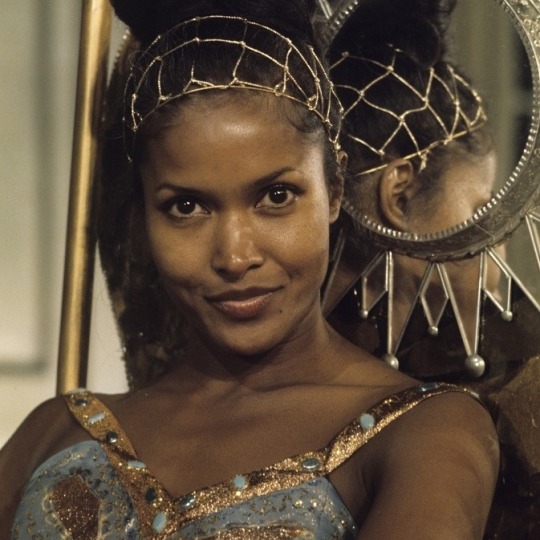
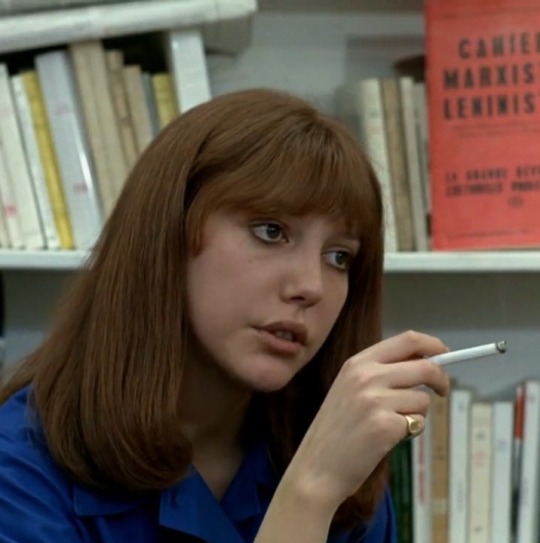
Propaganda
Marpessa Dawn (Black Orpheus)—She's like. fairy tale princess etheral pretty. truly eurydice realness. AND she's a singer AND she's a dancer. she used to be a governess/nightclub dancer, which isn't hot per say i just thought it was an interesting job combination. If you want to hear her sing just look up the Black Orpheus soundtrack
Anna Wiazemsky (Au Hasard Balthazar, La Chinoise, Il seme dell'uomo)— French New Wave icon, she had the sad girl aesthetic down to a T. She was also a talented writer and essayist.
This is round 1 of the tournament. All other polls in this bracket can be found here. Please reblog with further support of your beloved hot sexy vintage woman.
[additional propaganda submitted under the cut.]
Anna Wiazemsky:
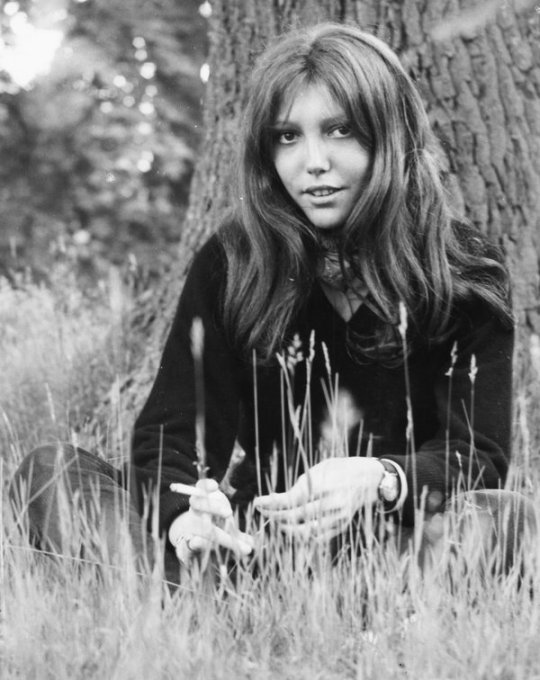
Marpessa Dawn:
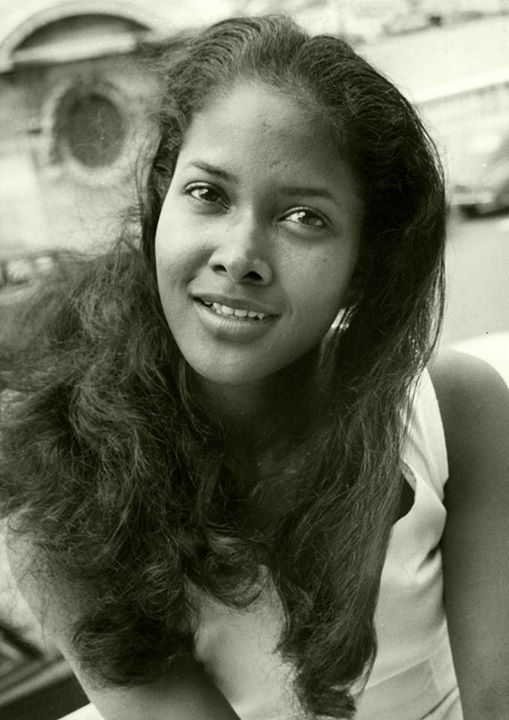
Marpessa Dawn was an filipina/african american who became well known as an actress, singer and dancer in France. She is most famous for her role in 'Black Orpheus' in which she played Eurydice. It's difficult to find a picture where she and her husband, the actor Eric Vander, aren't kissing or hugging or laughing together, they are incredibly cute (and hot).
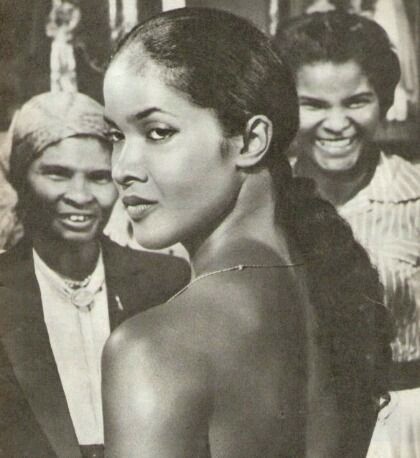
basically everyone and their mother will agree that marpessa dawn was one of THEE og vintage black women working in cinema (even if it was mostly in french cinema! the cross language barrier slay). mostly did her work in french cinema, and her smile in black orpheus is literally like the sun breaking over the sea
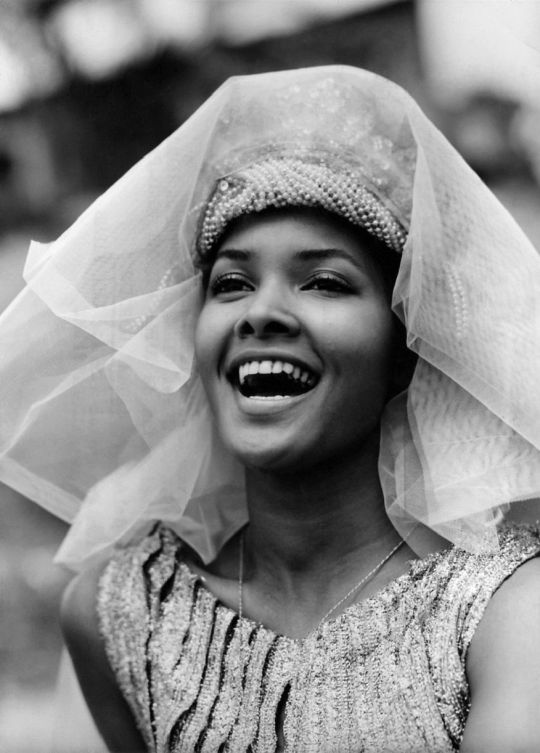
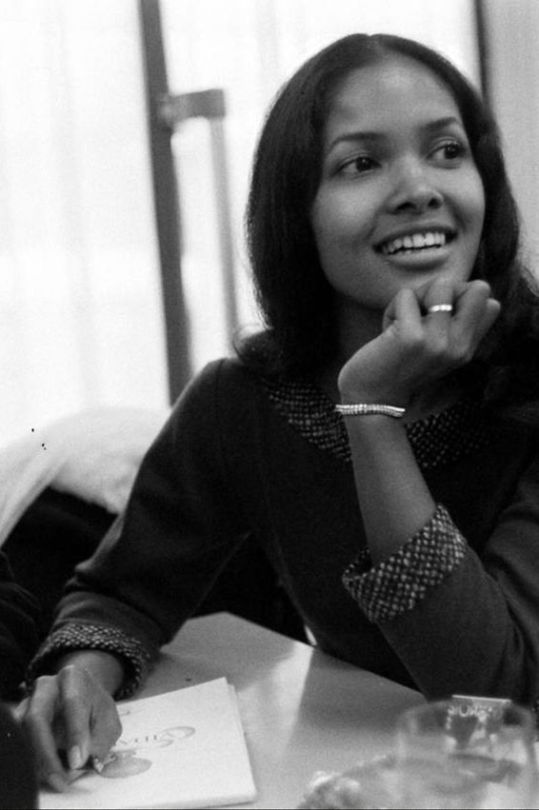

135 notes
·
View notes
Text
♀️latscho diwes djuviale♀️
💞 I made this blog to highlight the specific struggles Romani women face based on our sex, our race and our class
💞 I'm anti-gender, anti-sex trade, anti-religion, anti-capitalist
💞 I support women's and LGB rights. My feminism is female only!
💞 I'm a half-sinti, half-white working class homosexual woman living in Western Europe
BEFORE YOU BLOCK ME, READ THIS: x

FAQ, BOOKS AND RESOURCES BELOW
General / Frequently asked questions
-> Difference between Roma and Romanian (x)
-> Difference between Roma and Sinti (x)
-> My profile picture is from De la source à la mer (1984), by Sinti-Manouche filmmaker and writer Pisla Helmstetter
-> My banner is from The Gypsies are Found Near Heaven (1975), by Emil Loteanu
Posts on the racialized misogyny targeting Romani women
-> general masterpost (x)
-> posts on Romani women being sex trafficked into prostitution in Europe (x) (x)
-> posts on the forced sterilization of Romani women in Europe (x) (x) (x) (x)
-> post on healthcare discrimination (x)
-> incest, sexual and domestic violence targeting Eastern European Romani women (x) (x)
-> Roma, religion and misogyny (x)
-> On "Gypsy witches" (x)
Inspiring Romani women you should know about
-> autobiographies by Romani women (x)
-> Sandra Jayat, French-Romani painter and poet (x)
-> Katarina Taikon, Swedish-Romani writer and antiracist activist (x) (x)
-> Elena Gorolova, Czech-Romani women's rights advocate (x)
-> Jelena Savić, Serbian-Romani feminist, poet and essayist (x)
-> Tela-Tchaï, French-Romani actress (x)
-> Amoun Sleem, Palestinian-Domari antiracist activist and feminist (x)
-> Philomena Franz, German-Romani Holocaust survivor and writer (x)
-> Vera Kurtić, Serbian-Romani lesbian feminist (x)
-> Kiba Lumberg, Finnish-Romani and butch lesbian artist (x)
-> Zilli Schmidt, German-Romani Holocaust survivor (x)
-> "15 Bad ass Romani ladies you should know about" (x)
-> Romani herstory, an "ever-growing digital library that celebrates women of Romani descent from the past and present, unsung heroines & trailblazers who refuse(d) to conform to stereotypes"
Romani feminist writings
-> Intersections of Gender, Ethnicity, and Class: History and Future of the Romani Women’s Movement, by Jelena Jovanović, Angéla Kóczé, and Lídia Balogh (x)
-> Gender, Ethnicity and Class: Romani Women's Political Activism and Social Struggles, Angéla Kóczé (x)
-> Lessons from Roma Feminism in Europe: Digital Storytelling Projects with Roma Women Activists from Romania, Spain and Sweden, Jasmine Ljungberg (x)
-> Romani women’s identities real and imagined: Media discourse analysis of “I’m a European Roma Woman” campaign, Jelena Jovanović (x)
-> Džuvljarke: Roma Lesbian Existence, Vera Kurtić (x)
-> Re-envisioning Social Justice from the Ground Up: Including the Experiences of Romani Women, Alexandra Oprea (x)
-> Angéla Kóczé on the hijacking of the Romani feminist and antiracist movement by neoliberal groups (x) (x)
-> Mihaela Drăgan on the racialization of Romani women (x)
-> quotes from Romani feminist books (x)
Learn about the Romani genocide
-> general post (x)
The Genocide and Persecution of Roma and Sinti. Bibliography and Historiographical Review (x)
Roma Resistance During the Holocaust and in its Aftermath, Angéla Kóczé, Anna Lujza Szász (eds.) (x)
O Porrajmos: the Romani Holocaust, Ian Hancock (x)
Porrajmos: The Romani and the Holocaust, Ian Hancock (x)
Responses to the Porrajmos (the Romani Holocaust), Ian Hancock (x)
Barvalipe Roma Online University (playlist of lectures about many different aspects of Romani history, politics and culture) (x)
Romani slavery in Romania
Brief overview (x)
Alternatives to the labrys flag

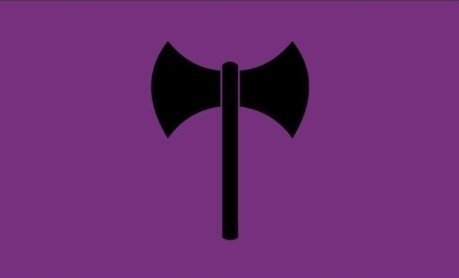
(first design by @/sapphos-darling)
362 notes
·
View notes
Text
THIS DAY IN GAY HISTORY
based on: The White Crane Institute's 'Gay Wisdom', Gay Birthdays, Gay For Today, Famous GLBT, glbt-Gay Encylopedia, Today in Gay History, Wikipedia, and more … November 21



1694 – Voltaire, French philosopher, born (d.1778); born François-Marie Arouet, better known by the nom de plume Voltaire, was a French Enlightenment writer, essayist, deist and philosopher known for his wit, philosophical sport, and defense of civil liberties, including freedom of religion and the right to a fair trial. He was an outspoken supporter of social reform despite strict censorship laws and harsh penalties for those who broke them. A satirical polemicist, he frequently made use of his works to criticize Christian dogma and the French institutions of his day.
The name "Voltaire," which he adopted in 1718 not only as a pen name but also in daily use, is an anagram of the Latinized spelling of his surname "Arouet" and the initial letters of the sobriquet "le jeune" ("the younger"): AROVET Le ieune. The name also echoes in reversed order the syllables of a familial château in the Poitou region: "Airvault".
In terms of religious texts, Voltaire was largely of the opinion that the Bible was: 1) an outdated legal and/or moral reference, 2) by and large a metaphor, but one that perhaps taught some good lessons, and 3) a work of Man, not a divine gift. These beliefs did not hinder his religious practice (It is a line from one of his poems that translates "If God did not exist, it would be necessary to invent Him.") though it did gain him somewhat of a bad reputation in the Catholic Church. He is best known today for his novel, Candide.
Voltaire blew hot and cold on the subject of homosexuality. Although he is known to have sampled the delights of same-sex love on one occasion, he nonetheless admonished a friend who wanted to try it a second time, "Once, a philosopher," he proclaimed, "twice, a sodomite!"
He was locked in a love-hate relationship with Frederick the Great, with whom he spent agonizing, ecstatic years. In her biography of Voltaire, Nancy Mitford writes that "nobody who studies the life of Voltaire can doubt that he had homosexual tendencies, and one wonders whether his feelings for the king were not exacerbated by unrequited passion."
Whatever his personal reservations about homosexuality, the famous French writer was forthright in declaring that sodomy, "when not accompanied by violence, should not fall under the sway of criminal law, for it does not violate the rights of any man." We will never know why Voltaire once signed a letter to a male friend, "E vi baccio il catzo," which, politely translated means, "I kiss your rod."


1915 – James Gleeson (d.2008) was one of Australia's foremost artists. He was also a poet, critic, writer and curator. He played a significant role in the Australian art scene, including serving on the board of the National Gallery of Australia.
Gleeson's themes generally delved into the subconscious using literary, mythological or religious subject matter. He was particularly interested in Jung's archetypes of the collective unconscious.
During the 1950s and '60s he moved to a more symbolic perspective, notions of human perfectibility. At this time he increasingly fashioned small psychedelic compositions made using the surrealist technique of decalcomania in the background, to suggest a landscape, and finished by adding a fastidiously painted male nude in the foreground.
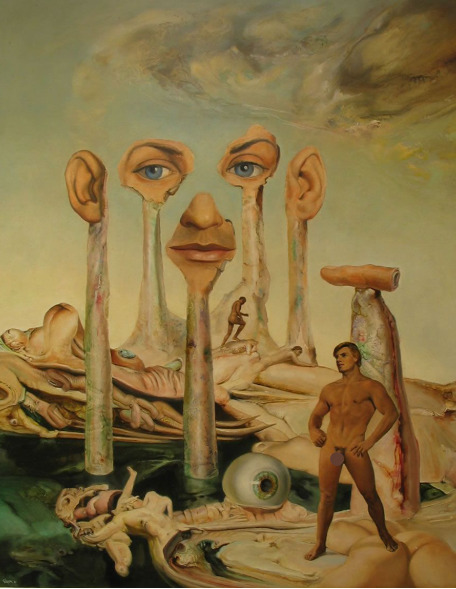
"Totems in Arcadia"
Many of his paintings had homoerotic undertones, something which reflected on Gleeson's own homosexuality. The ideas for these compositions also saw Gleeson move into collage with his Locus Solus series, where he produced a substantial body of work by placing dismembered photographs, magazine illustrations, diagrams and lines of visionary poetry against abstract pools of ink.
Since the 1970s Gleeson generally made large scale paintings in keeping with the surrealist Inscape genre. The works outwardly resemble rocky seascapes, although in detail the coastline's geological features are found to be made of giant molluscs and threatening crustaceans. In keeping with the Freudian principles of surrealism these grotesque, nightmarish compositions symbolise the inner workings of the human mind. Called 'Psychoscapes' by the artist. Gleeson's later works incorporate the human form less and less in its entirety, represented in his landscapes by suggestions, an arm, a hand or merely an eye.
Gleeson died in Sydney on 20 October 2008, aged 92, one year after his life partner Frank O'Keefe.


1940 – Keith Prentice (d.1992) was a Dayton, Ohio-born American TV, film and stage actor, whose most famous role was the part of Larry in both the original stage and film versions of The Boys in the Band. Prentice also appeared on the classic TV soap Dark Shadows during the series' final months in 1971. Until just several years ago, his picture was displayed on the Tasters Choice coffee label.
Prentice studied in New York City at the American Academy of Dramatic Arts. His stage musical credits include Sail Away, The Sound of Music, Paint Your Wagon, and The King and I. In 1968, he appeared off-Broadway in the non-musical The Boys in the Band, a then controversial play featuring gay characters at a dramatic birthday party - the Summer before the Stonewall gay civil rights riots. He also appeared in the movie version of the play. In 1971 Keith joined the cast of Dark Shadows playing Morgan Collins. Prentice also appeared as Nils Fowler in the 1972 film The Legend of Nigger Charley and had a small role in the 1980 film Cruising which, like Boys in the Band, was directed by William Friedkin.
In 1982 Keith Prentice co-founded Kettering Theatre Under The Stars, and directed summer shows there until the year of his death. He died of AIDS-related cancer on September 27, 1992 in Kettering, Ohio.


1947 – Nickolas Grace is a British actor known for his roles on television, including Anthony Blanche in the acclaimed ITV adaptation of Brideshead Revisited and the Sheriff of Nottingham in the 1980s series Robin of Sherwood. Grace also played Dorien Green's husband Marcus in the 1990's British comedy series Birds of a Feather.
Although Grace had a small uncredited part in The City of the Dead (1960), his first known work in feature films as an adult came with Bruges-La-Morte (1978) directed by Ronald Chase. After this, Grace secured the part of the flamboyant aesthete Anthony Blanche in Brideshead Revisited which filmed off and on from 1979 to 1981.
Following the success of Brideshead Revisited on television , Grace played Richard II at the Young Vic in 1981, and Mozart in Amadeus with Frank Finlay at Her Majesty's Theatre in 1982. He then began working in operetta, playing Koko in The Mikado and Joseph Porter in HMS Pinafore for Sadler's Wells Opera in repertoire from 1982-1986. The film Heat and Dust appeared in 1983. It was around this time that took the role of Robert de Rainault, the Sheriff of Nottingham, in ITV's Robin of Sherwood.
In the "official biography" of the actor Alan Bates, Otherwise Engaged, by Donald Spoto, Spoto quotes Grace describing his "intense affair" with Bates, who was "terrified of exposure": "I told him labels didn't matter, but that we must be who we are. But he just could not accept that. Alan was at ease as long as he pretended - and he insisted on pretending - that our relationship was not what it was, and was not disclosed to or evident to others."
Bates, who was then 39 and married, and Nickolas, who was 25, became in the latter's words "very close and very loving, in an intense affair that was one of the most important relationships of my life".
As he had with previous male lovers, Bates denied to Nickolas that he was truly homosexual. If they travelled by car together, "he made me lie down in the back - he didn't want me to be seen with him. That was an indication of the fear that he had".
When the inevitable split with Nickolas came, it was brutal. "It's been very nice to have known you," Alan told him with astonishing coolness one day, "and I'm sure I'll see you around in London." He spoke as if they had been polite colleagues on a project, or fellow travellers on a train journey. It took Nickolas months to recover.

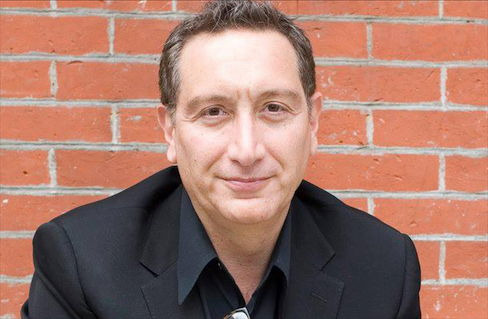
1963 – The playwright, director and founder of Tectonic Theater Project, Moisés Kaufman, was born on this date. He is the author of Gross Indecency: The Three Trials of Oscar Wilde, 33 Variations and is perhaps best known for writing The Laramie Project with other members of Tectonic Theater Project. He was born and raised in Caracas, Venezuela and moved to New York City in 1987. He made his Broadway directing debut in the 2004 production of I Am My Own Wife by Doug Wright, for which he received a Tony Award nomination for Best Direction of a Play. Mr. Kaufman is a Guggenheim Fellow.
Kaufman is of Romanian and Ukrainian Jewish descent. He described himself in an interview as "I am Venezuelan, I am Jewish, I am gay, I live in New York. I am the sum of all my cultures. I couldn't write anything that didn't incorporate all that I am."


1981 – Sergeant Charles Cochrane, a 14 year veteran of the NYPD, created shock waves by testifying before a New York City Council hearing in favor of a gay rights bill. Following on the testimony of a Patrolmen's Benevolent Association Vice President who denounced the bill, and declared he didn't know of any homosexual police officers, Cochrane stunned those present by announcing, "I am very proud of being a New York City Police Officer, and I am equally proud of being gay."
Cochrane's public testimony lent significantly toward the official formation of the Gay Officers Action League, Inc., aka G.O.A.L. - NY, which became the first official police fraternal society in the world to represent LGBT professionals within the criminal justice system. Since that time, similar organizations for LGBT Law Enforcement Officers, Criminal Justice professionals as well as Firefighters and EMS personnel have been established around the world.


1983 – Blake McGrath is a Canadian professional dancer, pop singer and choreographer. He was known for being on the first season of So You Think You Can Dance in 2005, and on the MTV reality dance show, DanceLife. He has also developed a solo singing career with a debut album Time to Move in 2010.
McGrath was born in Mississauga, Ontario.
His early television appearances include: Choices of the Heart: The Margaret Sanger Story (1997) playing Stuart Sanger, and the TV show recreation of Goosebumps book "Stay Out of the Basement". He played the brother Casey.
In 2015, McGrath was chosen to perform on Michael Jackson's thirtieth anniversary special. In 2006, he performed alongside Paulina Rubio at the 2004 Latin Grammy Awards. Also in 2006 he had an appearance in the documentary Freestyle (with Brian Friedman). He has appeared in Gap campaigns (with Sarah Jessica Parker), and in advertisements for iPod, Jc Penny (which he also choreographed), and Hummer.
He has danced with stars such as Madonna, Britney Spears, Kylie Minogue, Janet Jackson, Adam Lambert, Ashanti, Destiny's Child, Katy Perry, Craig David, Jewel.
In addition to his appearances on television shows, McGrath has also appeared in the films Butterbox Babies, Life With Mikey, Chicago, and Rent. He was also featured as a dancer in The Suite Life of Zack & Cody in the episode Commercial Breaks. He was a waiter. He studied at both Tiffany Dance Academy in Hamilton Ontario and Joanne Chapman School of Dance in Brampton, Ontario.
He is owner of VIP Dance Events which tours major cities throughout Canada. He also appeared on the magazine cover of Hotshoes and appeared in Dance Spirit Magazine December 2006 issue. Lastly, he appeared on the 9/10/13 episode of Dance Moms as a guest choreographer. He is the lead choreographer for the audition cities and alternating third judge on So You Think You Can Dance Canada.
He is bisexual. "I've been attracted to men and attracted to women," he told Canada's gay mag Fab. "My feelings change all the time. One day I can feel like I'm gay, another day like I'm straight. But I'm not just one or the other, I'm Blake McGrath and I'm attracted to somebody on the inside.


2006 – Israel's Supreme Count recognizes international same-sex marriages.



Today's Gay Wisdom:
Quotes from Voltaire:
A witty saying proves nothing.
All murderers are punished unless they kill in large numbers and to the sound of trumpets.
Anyone who has the power to make you believe absurdities has the power to make you commit injustices.
Anything that is too stupid to be spoken is sung.
Behind every successful man stands a surprised mother-in-law.
Better is the enemy of good.
Common sense is not so common.
Each player must accept the cards life deals him or her: but once they are in hand, he or she alone must decide how to play the cards in order to win the game.
Every man is guilty of all the good he did not do.


10 notes
·
View notes
Text
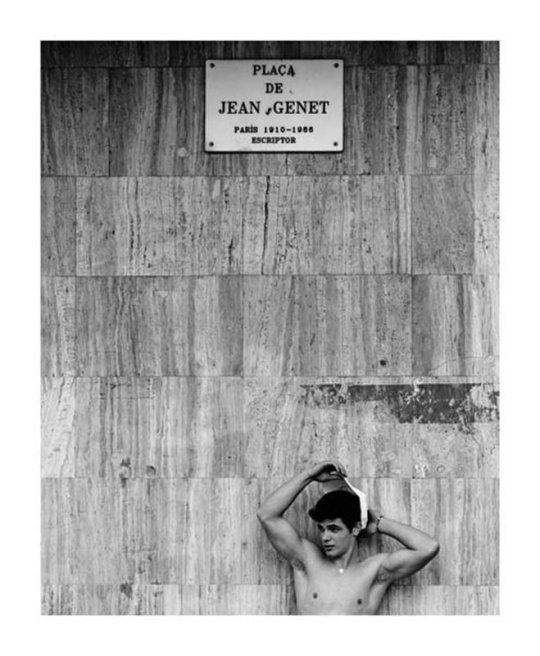
Photography by Daniel Riera
Plaça de Jean Genet is a small, triangle-shaped square in Barcelona. It's located in the southern side of El Raval, by the port and Avinguda de les Drassanes and the Catalan Gothic buildings of the Royal Shipyard, in the district of Ciutat Vella. It is named after French author Jean Genet who resided in the city for a time and whose novel The Thief's Journal takes place in the poverty-stricken alleys of Raval. Essayist Lluís Permanyer proposed the name in 1997.
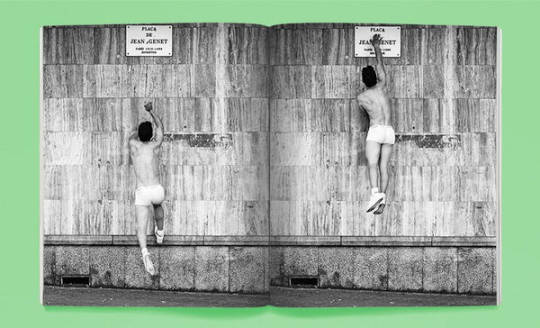
#jean genet#plaça de jean genet#barcelona#daniel riera#el raval#raval#lluís permanyer#the thief's journal
27 notes
·
View notes
Text
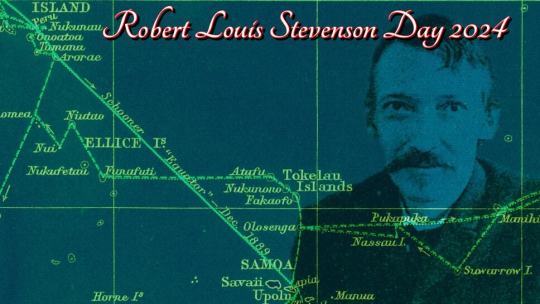
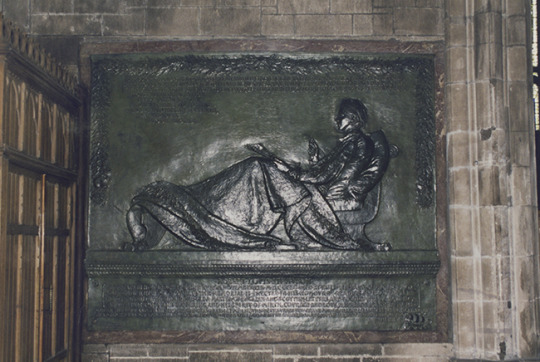
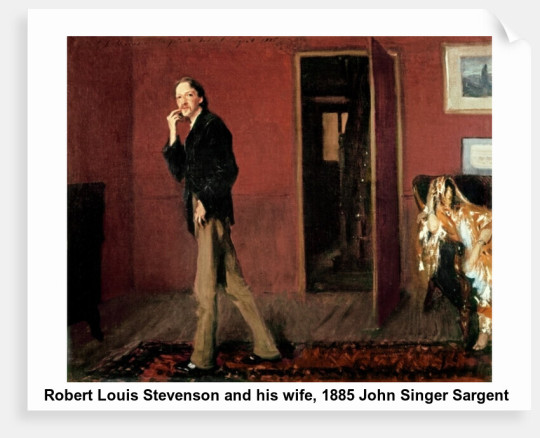
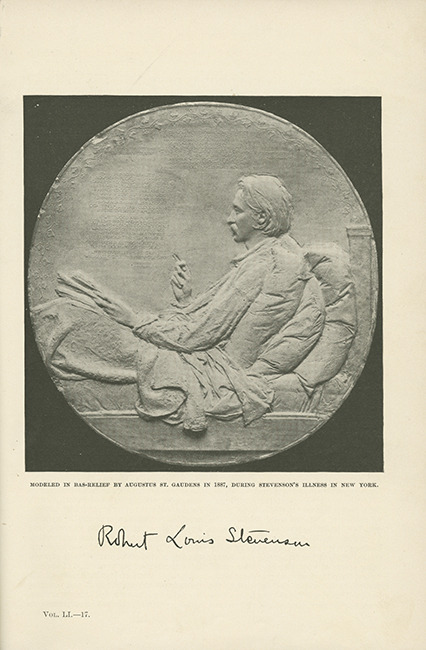
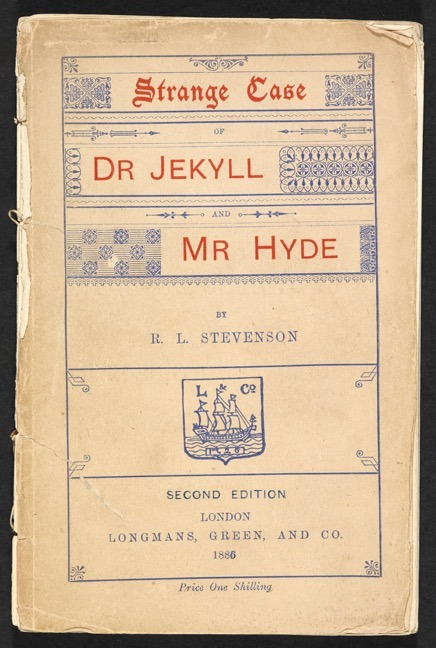
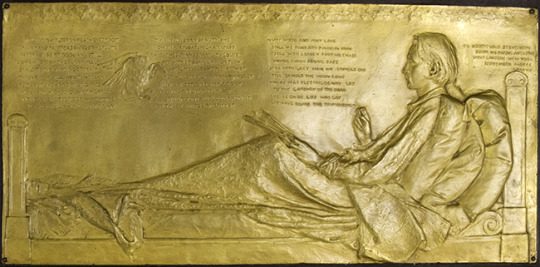
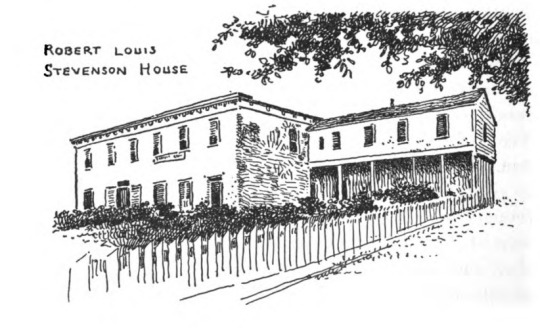
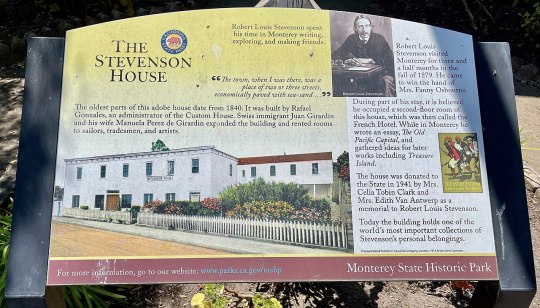
November 13th 1850 saw the birth in Edinburgh of Robert Louis Stevenson, the renowned essayist, poet, and author of fiction and travel books.
Nowadays we remember the man with an anual event, Robert Louis Stevenson Day 2024 includes a number of events for fans to attend. The event which includes readings, screen shows and an unbirthday party. Although most events take place here in Edinburgh on Saturday you can find the unbirthday party in Monterey Public Library, Clifornia. Remarkaqbly this dates back to 1891 when Annie Ide, the 12-year-old daughter of the American Land Commissioner in Samoa, told RLS of her disappointment that there were no special celebrations to mark her birthday on Christmas Day, he came up with an ingenious solution. As a qualified Scottish advocate, he drew up a legal document declaring: ‘I, Robert Louis Stevenson . . . have transferred and do hereby transfer to the said A.H. Ide, all and whole my rights and privileges in the thirteenth day of November, formerly my birthday, now, hereby and henceforth, the birthday of the said A.H. Ide.’ Now each year the Robert Louis Stevenson Club of Monterey holds aan event as such.
Stevenson had a brief sojourn in the Californian town in 1879, he went there to court Fanny Osbourne, a woman he met in France and fallen deeply in love with. Fanny was from Oakland and had returned to attempt a divorce from her husband. She had summoned Stevenson from his family home in Edinburgh and he readily obeyed her request. He wrote a memoir of his journey from New York through the heart of America, to the West coast in The Amateur Emigrant. Although brief, Stevenson’s time in Northern California deeply affected his work, inspiring his classic tales of adventure. RLS boarded at the French Hotel there, it is now known as Stevenson Houseand is a museum and property of the Monterey State Historic Park. t holds a large collection of Stevenson papers and Stevenson memorabilia. It features a bas relief depicting the author writing in bed, as seen in the pics. The second of the photos is Robert Louis Stevenson's Memorial in St Giles, Edinburgh.
8 notes
·
View notes
Text
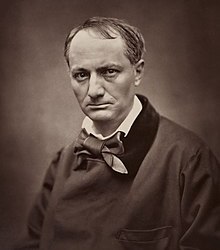
Charles Pierre Baudelaire (9 April 1821) was a French poet who also worked as an essayist, art critic and translator.
“Do not look for my heart any more; the beasts have eaten it.”
Charles Baudelaire, Les Fleurs du Mal
#Charles Baudelaire#french literature#symbolism#poetry#poems#poet#poetic#writers and poets#poem#poems on tumblr#poems and poetry#words words words#original poem#aesthetic#romance#spilled ink#spilled words#spilled poetry#light academia#light academia aesthetic#classic academia#dark academia#romantic academia#dark acadamia aesthetic#chaotic academia#literature#lit#words#classic literature#art
21 notes
·
View notes
Text
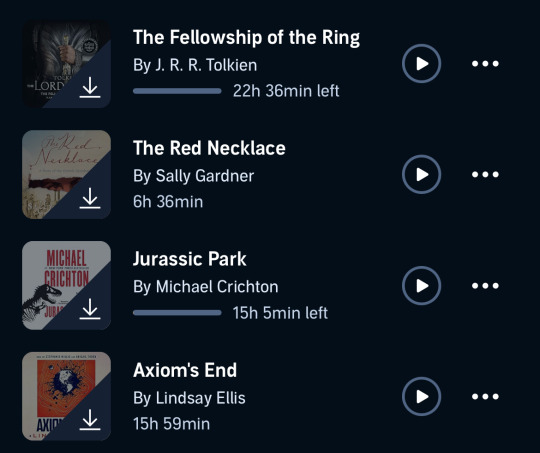
HELP ME DECIDE WHAT AUDIOBOOK TO LISTEN TO PLEASE i am going insane with indecision 😭
Fellowship - I’ve been trying to get through reading this book for years and can never manage it no thanks to Tom bombadil so I thought maybe the audiobook will finally carry me through. Plus I just got a LotR Lego set so I’m in a bit of a Tolkien mood.
Red necklace - this would be a re-listen. Not the greatest book (about the French Revolution and Romani people and some mystic and confusing magic… could be interesting but writing is a bit weak), but Tom Hiddleston narrates it and is absolutely delightful and does like a dozen different accents extremely well
Jurassic park - been wanting to read/listen to the book for a long time, I’m a big fan of the first movie and I’m curious to see how the book and movie differ, plus it’s science-y and I love that
Axiom’s End - novel written by one of my favourite video essayists, narrated partially by one of my other favourite video essayists. I don’t know much about it except that it’s dystopian and set in the early/mid 00’s.
#polls#audiobooks#fellowship of the ring#the red necklace#Jurassic park#axiom’s end#Sally Gardner#michael crichton#Lindsay Ellis#jrr tolkien#help plz
8 notes
·
View notes
Text
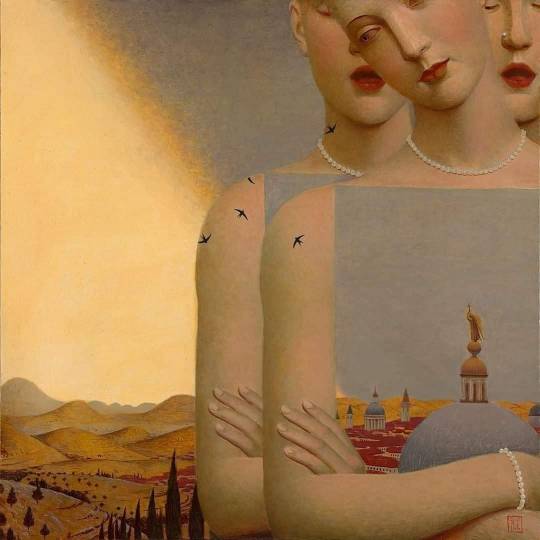
Andrey Remnev Thunder and Lightening, 2019
唯一能拯救人類的就是愛。 如果許多人最終把這種說法變成了平庸的話,那是因為他們從未真正愛過。
La sola cosa che possa salvare l’uomo è l’amore. E se molti hanno finito per trasformare in banalità questa asserzione, è perché non hanno mai amato veramente.
- Emil Cioran, Al culmine della disperazione /1911-1995 羅馬尼亞旅法哲人,二十世紀懷疑論、虛無主義重要思想家,有羅馬尼亞語及法語創作格言、斷章體哲學著述傳世,以文辭精雅新奇、思想深邃激烈見稱。Romanian philosopher, aphorist and essayist, who published works in both Romanian and French. His work has been noted for its pervasive philosophical pessimism, style, and aphorisms. His works frequently engaged with issues of suffering, decay, and nihilism. In 1937, Cioran moved to the Latin Quarter of Paris, which became his permanent residence, wherein he lived in seclusion with his partner, Simone Boué, until his death in 1995.
11 notes
·
View notes
Text
Le Poison des Pierreries
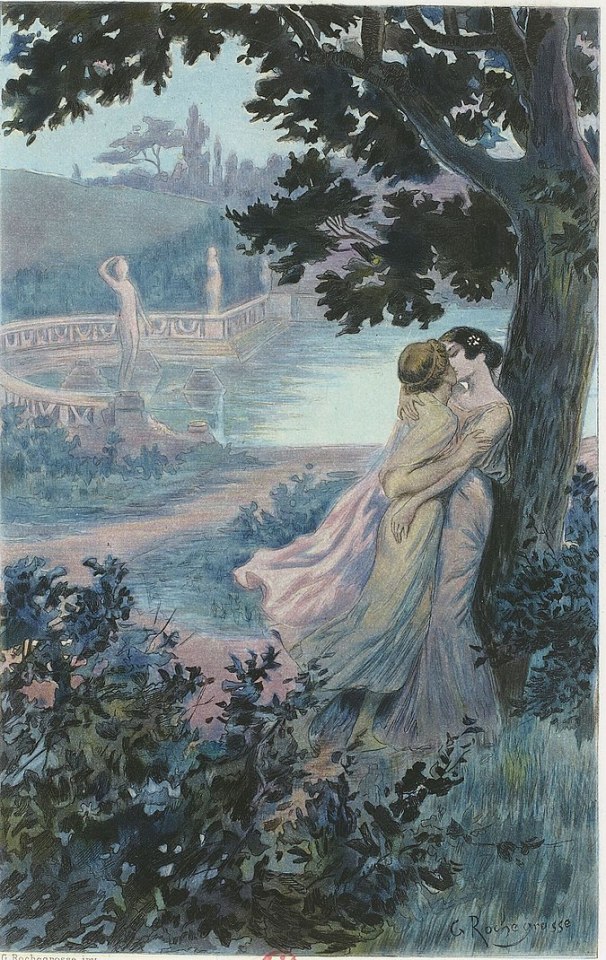
Two women kissing in nature, by Georges Rochegrosse (1859-1938).
This is such a sweet picture. I’ve seen it pop up a few times on Tumblr.
And now I am going to ruin it. But then I’m going to try and unruin it! However, if you just want two girls kissing in nature then scroll on by and vote in some polls. It’s all good.
So this is an illustration from 1903 French novelette Le Poison des Pierreries (The Poisoned Stones) The two characters kissing are the Princess Alilat (the tall brunette) and the Prince Sparyanthis (the blond). Sparyanthis is eighteen years old and we weren’t yet at the point where we required super-buffness to indicate masculinity, so the artist depicts him as a pretty youth. But don’t stop reading! Because 1.) this is a tale of eroticism, revenge, obsession, and treacherous murder by sorcery, and who doesn’t love all that? and 2.) there is nothing straight about this couple or this novel.
Also, 3.) it’s pretty sexy. So, you know. Be aware fellow asexuals.
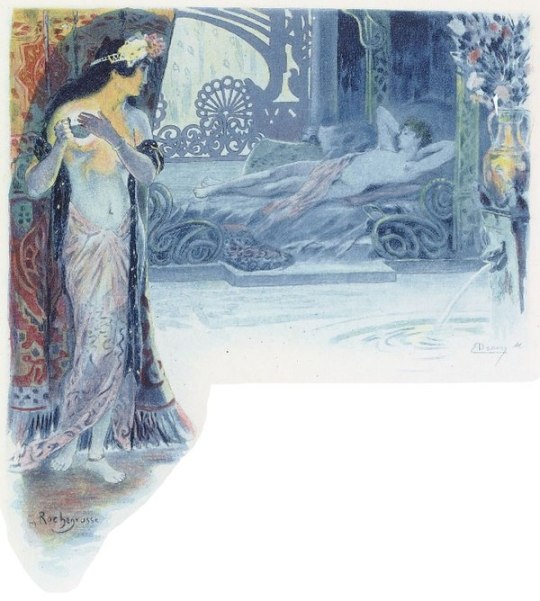
Le Poison des Pierreries was written by the author and essayist Camille Mauclair for his friend the Orientalist Georges Rochegrosse to illustrate. Orientalism was very pretty but very, very problematic and if you don’t know why you can easily find out by doing a search.
(BTW I am not an expert on textual analysis or art history, or queer and gender theory, and know almost nothing about the French language — when I get stuff wrong feel free to let me know! I’m sure at the very least there are lots of classical allusions I’m missing.)
Also: there’s some implied lack of consent in this story.
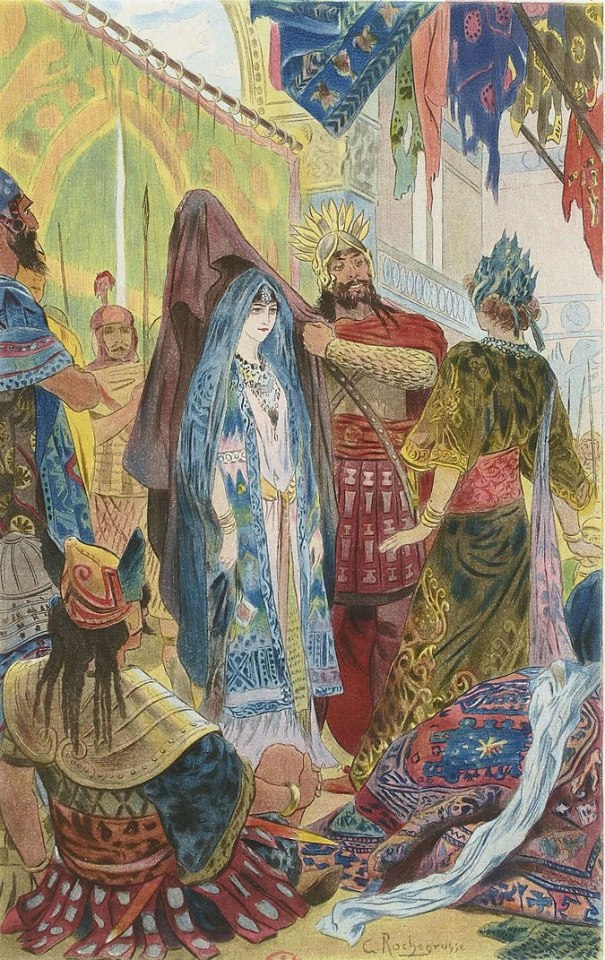
The novelette tells of the distant city of Etesia. It is ruled by two brothers, the doughty warrior Cimmérion and the beautiful, decadent Sparyanthis. They are really really fond of each other. But in a way that wasn’t a big deal in 1903.
Cimmérion arrives home from war with the beautiful princess Alilat whom he has forced into marriage. Alilat is now the last of her house, thanks to Cimmérion, because he’s slaughtered everyone she ever knew, and she has opinions about this. Despite Sparyanthis’ best intentions, Alilat beguiles him, and they begin having an affair while Cimmérion is away hunting each day. ‘Two women kissing in nature’ is the moment when Sparyanthis finally gives in to his desire for Alilat.
But Alilat is (understandably) after revenge for herself and her people, and she uses her sorceries to bring a strange malady upon Cimmérion that robs him of his strength. At the same time she relishes the agonies of guilt Sparyanthis feels over his ongoing betrayal of his beloved brother.
Eventually everyone dies!
But until that happens there is a lot of queer sex going on.
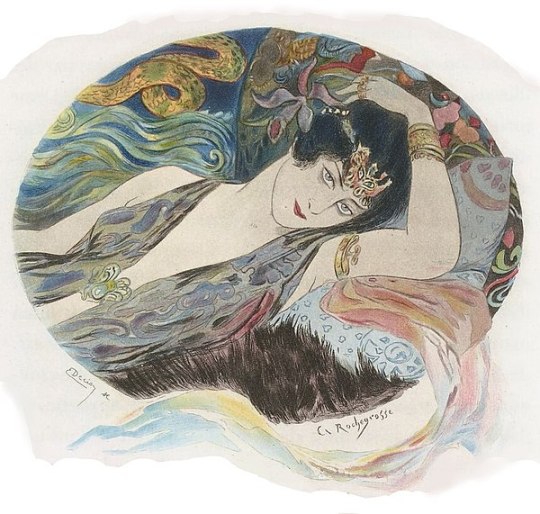
The Queerness
So we can try and read this story as someone from 1903, or we can read it as someone from today. In 1903 it’s a story of masculinity as a vital, conquering, barbarous force versus femininity as a languid, yielding, civilising… perhaps too civilising… influence. A healthy nation was thought to be warlike and ever-expanding. Old civilizations — like the ancient nations of the East — were regarded as rich but dwindling due to becoming too decadent; their sexual mores (which the West took a not at all creepy interest in; c.f. Richard Burton) were held to be intriguing but Not The Done Thing. A proper western couple — one (1) man + one (1) woman, married — had quick, penetrative sex and then went to sleep or something idk. This is how Cimmérion takes Alilat, and she loathes him for it (there’s a line about her ‘being thrown down upon the couch of the conqueror’ and having to endure his caresses). Real men are too busy hunting or making war or running kingdoms to bother much about girls.

But Sparyanthis is quite a different sort of person from his dull brother. He wanders around the palace in women’s clothes having sex with whoever he finds; the explicit incidents are with women, but there are plenty of young men in the illustrations. And everyone is down with it because the Etesians are known for two things: war and having A LOT of sex, never mind with who (at one point Spary can seek out Aliat at night because all the servants are busy making out with all the soldiers in alcoves).
Both in words and illustrations Mauclair and Rochegrosse suggest Sparyanthis is a young woman. He is ‘more beautiful that all the maidens of that country’. He is frequently described as wearing women’s robes, or of being naked except for his jewellery. He is languid and wanton (not vigorous and virile like Cimmérion), with golden tresses and soft, white limbs. There are suggestions that he is sometimes rouged or kohl-eyed, but I don’t trust my translation enough to say for sure. He lays around on couches and beds a lot, and delves into non-manly stuff like magic and secret knowledge. There’s much made of how devoted to each other the two brothers are because of their differences. Soft, white Sparyanthis idolises tanned, brawny, bearded Cimmérion, and Cimmérion ‘adores Sparyanthis’ beautiful body’.
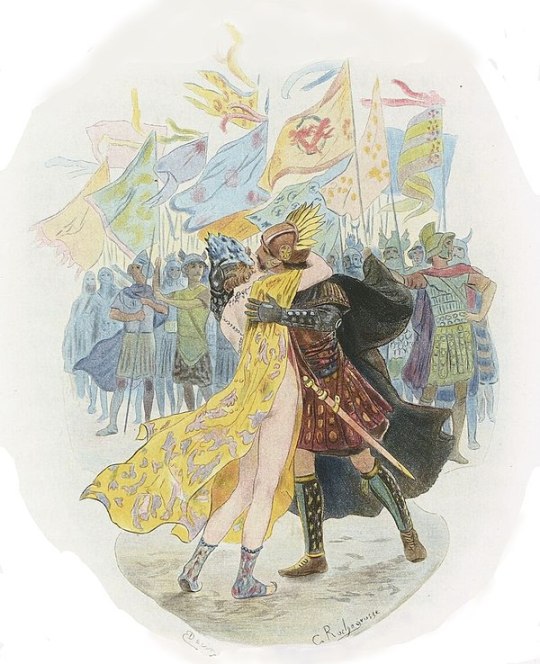
Alilat, meanwhile, is not an Etesian and is accustomed to wearing sombre modest clothing (there is a scene where Sparyanthis invites her to one of his afternoon gambols, and when everyone strips off and starts making out Alilat remains in her black robes and pointedly focuses only on her host, Sparyanthis, and he wonders what’s going on). But once she seduces Sparyanthis, she starts playing with gender too: she frequently meets him dressed in masculine clothes, while he is still in his woman’s garments. She is a vital force, determined as she is to achieve her revenge, and this is juxtaposed with Sparyanthis’ languorous attitude. She is compared to a hunter, and him to the quarry.
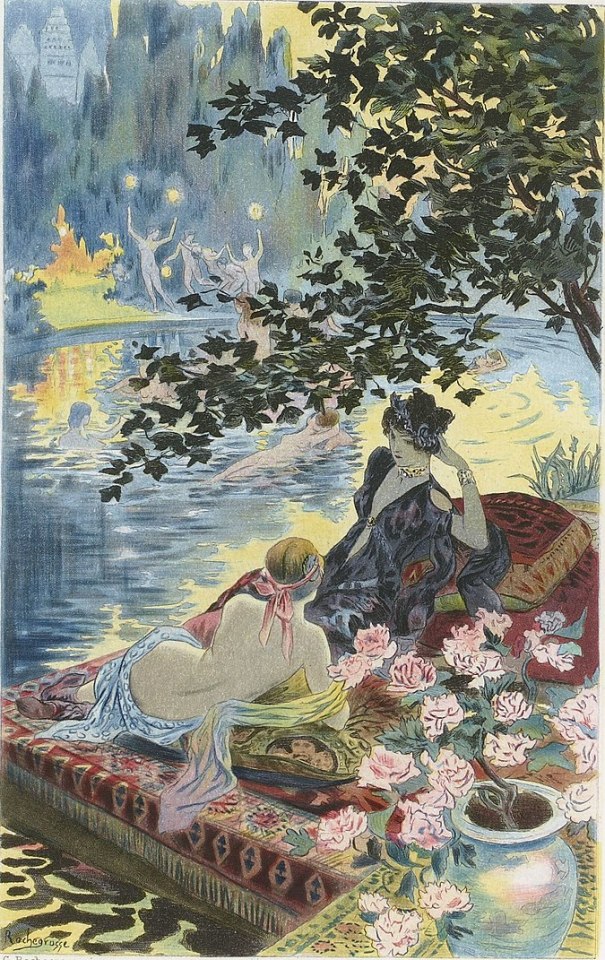
Alilat explicitly cannot stand the touch of a man, so she's having an affair with the beautiful, voluptuous Sparyanthis... because neither her nor the story considers him a man.
She intends to destroy both Cimmérion and the city of Etesia, and she takes a devilish glee in how tortured with guilt Sparyanthis is, but she does seem to be as sexually obsessed with him as he is with her. And there are moments of maternal kindness too, where she fondly treats Spary like a younger sister.
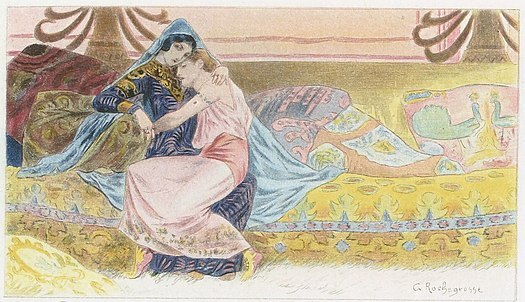
So while in 1903 it’s a story of what city-destroying calamities happen when men and women don’t follow their natures or whatever, today it reads like messed up queer people having a lot of queer sex. And I think it’s definitely much more fun to read it that way.
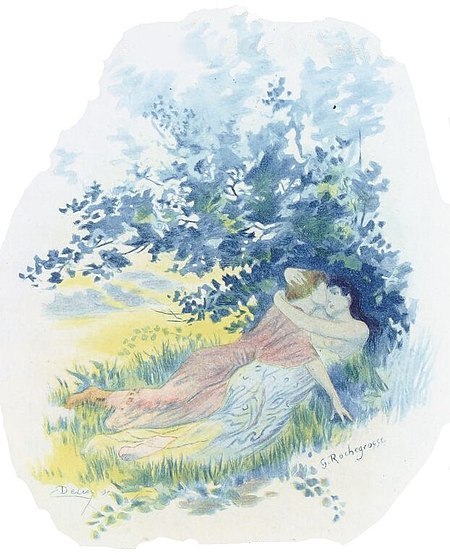
The Sex
So I am asexual and modern sex stuff doesn’t really do much for me. But, tell you what, 1903 veiled door sex knows what it’s about.
Everyone is having great sex here, and it’s implied that because of all this sensuality the kingdom is doomed to fall: the ‘warm voluptuousness’ is ‘softening the men’. You just can’t run a country while everyone’s fucking all the time, and Mauclair is here to tell you all about how bad an idea it is.
No sex is ever described (though it’s taking place in the background of at least one illustration), so the excitement is all in the set-up: Alilat abducts and fucks Sparyanthis while dressed as one of his own archers (“and seized him with the audacity of a soldier taking a weak, conquered Syrian”). A bearded magician approaches Sparyanthis while he is studying the stars in his chambers and traces on the ground with a wand the symbol for an astrological union, and then the 'magician' opens her robe enough to reveal her breasts and they have sex with Alilat still wearing her false beard. I mean
They met in secret caves and rut like beasts, howling, then sit in the throne room in their official robes and give each other secret looks (which, to be fair, is kind of like every new love affair).
Sadly there are no illustrations of any of this! I guess Rochegrosse just wanted to draw beautiful youths embracing and had no time for Mauclair's gender-switching antics, and I think that's a shame.
Anyway, because Cimmérion has laid hands upon Alilat without her permission she has come up with a very particular murder scheme. She tells Sparyanthis that Cimmérion prefers to take her ‘naked save all her jewellery’ and so she enchants her jewellery to burn away his vitality while it caresses his bare skin — the Poisoned Stones of the story’s title. The very act of sex brings about the stoic Cimmérion's murder.
Everyone in Etesia is making out with everyone else, and Cimmérion’s and Alilat’s marriage seems to be the only expected exception to all this polyamoury or so you would think. But then comes the kicker at the end: as Cimmérion lies on his death bed he tells Sparyanthis and Alilat that he knew all about their secret love the whole time and he was totally okay with it: they should carry on with his blessing. Sparyanthis is not okay about that. But too late, bud.
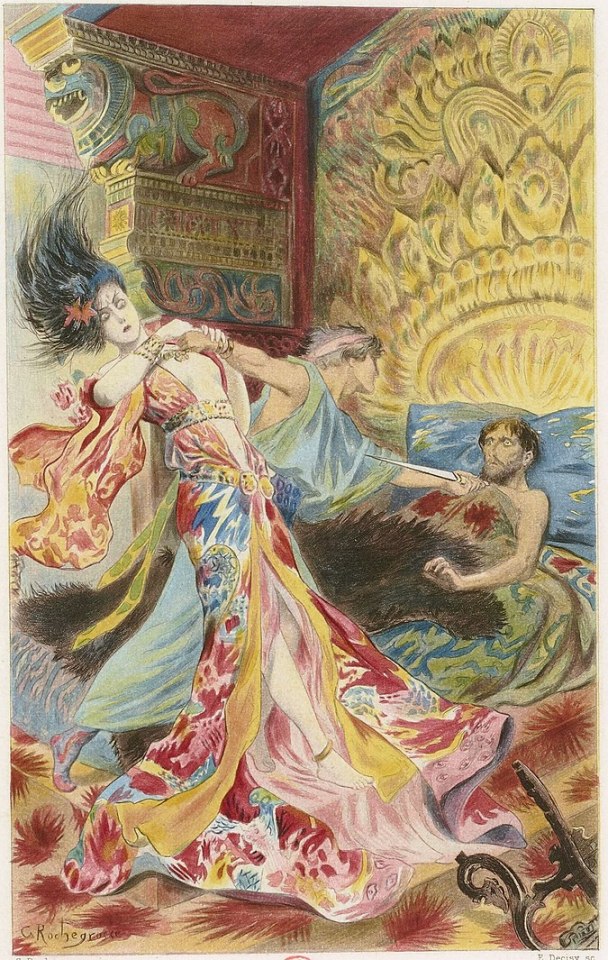

Anyway, not two women kissing in nature, but — I think — two genderqueer people kissing in nature. Read it for yourself! It’s really short!

(Okay, so this is too long already, but Alilat is just so cool. She sends dreams to Spary and begins seducing him before they've even met.
There’s this whole bit where she summons up a spirit of fire from the underworld to infuse her jewellery with wicked magics, and Sparyanthis is like “Do we need to use sorcery? Can’t we just stab him?” and Alilat says “Don’t be such a nerd, Sparyanthis, I wanna do it with evil sex.”
And there’s also another part where she’s wondering about how it will all turn out once Cimmérion is dead, and she’s thinking that maybe she’ll usurp the throne, but then again maybe she’ll just destroy the kingdom and then ride out across the desert as it falls, laughing, and then she’ll go to the mountains and establish her own country of sorceresses and she will be their queen.
And hey, maybe the Alilat who ‘died’ was only a simulacrum and the real Alilat did just that. I hope so, people should just leave a girl alone.)
#Le Poison des Pierreries#French Novel (1903)#Two women kissing in nature#by Georges Rochegrosse (1859-1938)#Playing with gender#Genderqueer#orientalism#A lot of sex#Like a LOT#Sorcery
123 notes
·
View notes